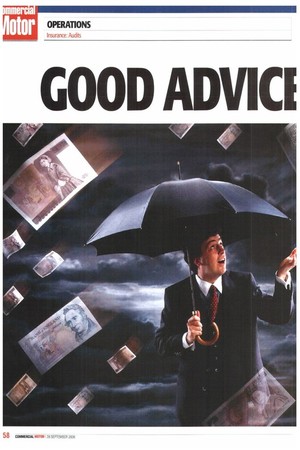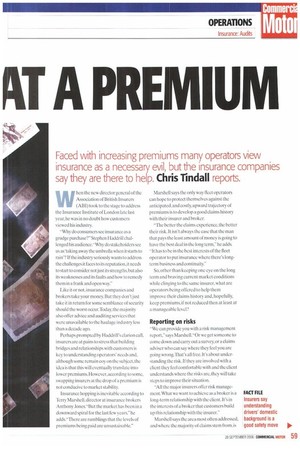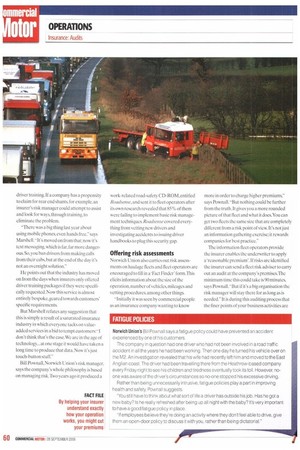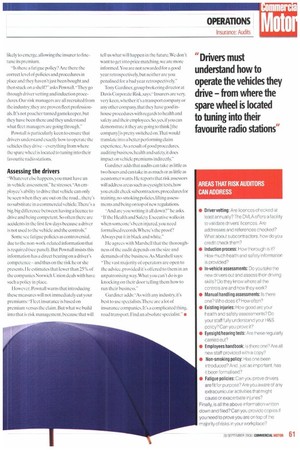G O OD 141W1 C I RT A PREM IUM
Page 58

Page 59

Page 60

Page 61

If you've noticed an error in this article please click here to report it so we can fix it.
Faced with increasing premiums many operators view insurance as a necessary evil, but the insurance companies say they are there to help. Chris Tindall reports.
. _ (ABI) took to the stage to address the Insurance Institute of London late last year, he was in no doubt how customers viewed his industry.
"Why do consumers see insurance as a grudge purchase?" Stephen Haddrill challenged his audience. 'Why do stakeholders see us as 'taking away the umbrella when it starts to rain'? If the industry seriously wants to address the challenges it faces to its reputation, it needs to start to consider not just its strengths, but also its weaknesses and its faults and how to remedy them in a frank and open way."
Like it or not, insurance companies.and brokers take your money. But they don't just take it in return for some semblance of security should the worst occur.Today, the majority also offer advice and auditing services that were unavailable to the haulage industry less than a decade ago.
Perhaps prompted by Haddrill's clarion call, insurers are at pains to stress that building bridges and relationships with customers is key to understanding operators' needs and, although some remain coy on the subject, the idea is that this will eventually translate into lower premiums. However, according to some, swapping insurers at the drop of a premium is not conducive to market stability.
Insurance hopping is inevitable according to Terry Marshell.director at insurance brokers Anthonyknes."But the market has been in a downward spiral for the last few years," he adds. "There are rumblings that the levels of premiums being paid are unsustainable." Marshell says the only way fleet operators can hope to protect themselves against the anticipated, and costly, upward trajectory of premiums is to develop a good claims history with their insurer and broker.
"The better the claims experience, the better their risk. It isn't always the case that the man that pays the least amount of money is going to have the best deal in the long term," he adds. "It has to be in the best interests of the fleet operator to put insurance where there's longterm business and continuity."
So, other than keeping one eye on the long term and braving current market conditions while clinging to the same insurer, what are operators being offered to help them improve their claims history and, hopefully, keep premi ums, if not reduced then at least at a manageable level?
Reporting on risks We can provide you with a risk management report," says Marshell. "Or we get someone to come down and carry out a survey, or a claims adviser who can say where they feel you are going wrong:that's all free. It's about understanding the risk. If they are involved with a client they feel comfortable with and the client understands where the risks are, they will take steps to improve their situation.
"All the major in.surers offer risk management.What we want to achieve as a broker is a long-term relationship with the client. It's in the interests of a broker that customers build up this relationship with the insurer."
Marshell says the area most often addressed, and where the majority of claims stem from, is driver training. If a company has a propensity to claim for rear end shunts, for example, an insurer's risk manager could attempt to assist and look for ways, through training, to eliminate the problem.
"There was a big thing last year about using mobile phones, even hands free," says Marshell.-It's moved on from that: now it's text messaging, which is far, far more dangerous. So, you ban drivers from making calls from their cabs, but at the end of the day it's not an overnight solution."
He points out that the industry has moved on from the days when insurers only offered driver training packages if they were specifically requested. Now this service is almost entirely bespoke, geared towards customers' specific requirements.
But Marshell refutes any suggestion that this is simply a result of a saturated insurance industry in which everyone Lacks on valueadded services in a bid to tempt customers:"I don't think that's the case. We are in the age of technology.., at one stage it would have taken a long time to produce that data. Now it's just touch-button stuff."
Bill Pownall,Norwich Union's risk manager, says the company's whole philosophy is based on managing risk.Two years ago it produced a work-related road-safety CD-ROM,entitled Roadsense, and sent it to fleet operators after its own research revealed that 85% of them were failing to implement basic risk management techniques. Roadsense covered everything from vetting new drivers and investigating accidents to issuing driver handbooks to plug this security gap.
Offering risk assessments
Norwich Union also carries out risk assessments on haulage fleets and fleet operators are encouraged to fill in a 'Fact Finder' form.This elicits information about the size of the operation, number of vehicles, mileages and vetting procedures. among other things.
"Initially it was seen by commercial people as an insurance company wanting to know more in order to charge higher premiums," says Pownall.''But nothing could be further from the truth. It gives you a more rounded picture of that fleet and what it does. You can get two fleets the same size that are completely different from a risk point of view. It's not just an information gathering exercise; it rewards companies for best practice."
The information fleet operators provide the insurer enables the underwriter to apply a 'reasonable premium'. If risks are identified the insurer can send a fleet risk adviser to carry out an audit at the company's premises.The minimum time this could take is 90 minutes, says Pownall."But if it's a big organisation the risk manager will stay there for as long as is needed." It is during this auditing process that the finer points of your business activities are likely to emerge, allowing the insurer to finetune its premium.
-Is there a fatigue policy? Are there the correct level of policies and procedures in place and they haven't just been bought and then stuck on a shelf?" asks Pownall."They go through driver vetting and induction procedures. Our risk managers are all recruited from the industry; they are proven fleet professionals.It's not poacher turned gamekeeper, but they have been there and they understand what fleet managers are going through."
Pownall is particularly keen to ensure that drivers understand exactly how to operate the vehicles they drive everything from where the spare wheel is located to tuning into their favourite radio stations.
Assessing the drivers
"Whatever else happens, you must have an in-vehicle assessment," he stresses."An employee's ability to drive that vehicle can only be seen when they are out on the road... there's no substitute in a commercial vehicle.There's a big, big difference between having a licence to drive and being competent. So often there are accidents in the first few days because a driver is not used to the vehicle and the controls."
Some sec fatigue policies as controversial, due to the non-work-related information that is required (see panel). But Pownall insists this information has a direct bearing on a driver's competence and thus on the risk he or she presents. l le estimates that fewer than 25% of the companies Norwich Union deals with have such a policy in place.
However. Pownall warns that introducing these measures will not immediately cut your premiums:"Fleet insurance is based on premium versus the claim. But what we build into that is risk management, because that will tell us what will happen in the future.We don't want to get into price matchi lig, we are more informed. You are not rewarded for a good year retrospectively, but neither are you penalised for a had year retrospectively."
Tony Gardiner,group brokering director at Davis Corporate Risk, says:"Insurers are very very keen, whether it's a transport company or any other company, that they have good inhouse procedures with regards to health and safety and their employees. So, yes, if you can demonstrate it they are going to think [the company] is pretty switched on.That would translate into a better performing claim experience. As a result of good procedures, auditing business, health and safety, it does impact on vehicle premiums indirectly."
Gardiner adds that audits can take as little as two hours and can take in as much or as little as a customer wants. He reports that risk assessors will address areas such as eyesight tests, how you credit check subcontractors, procedures for training,no-smoking policies, lifting assessments and being on Lop of new regulations.
"And are you writing it all down?" he asks. "If the Health and Safety Executive walks in when someone's been injured, you need formalised records. Where's the proof? Always put it in black and white."
He agrees with Marshell that the thoroughness of the audit depends on the size and demands of the business. As Marshell says: "The vast majority of operators are open to the advice, provided its offered to them in an unpatronising way.What you can't do is go knocking on their door telling them how to run their business."
Gardiner adds:"As with any industry, it's best to use specialists.There are a lot of insurance companies. It's a complicated thing, road transport. Find an absolute specialist.•
































































































































































































